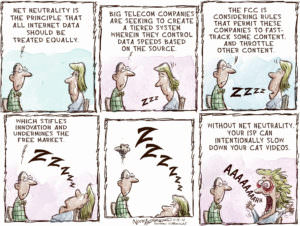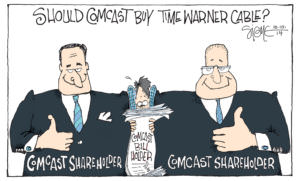Those Were the Days
The partisan segmentation of newspapers that existed in the early part of last century is gone, along with too many newspapers themselves, only to be replaced by partisan segmentation in other forms of media.The writer was an upstate New York lawyer active in Democratic politics. When his column, “Between Neighbors,” debuted in 1928, he outlined his goal of offering an evenhanded assessment of current events.
“The day has gone by when you can fool people into believing that the nation, or a state or a country or a city is going to the dogs just because one political party happens to be in power in it,” he wrote. “People are sick of the kind of editorial writing which sees only good in every measure and every man sponsored by one party and only bad on the other side. … That is one reason why the bitterly partisan press is losing its influence in this country.”
My friend John Barrett, a law professor at St. John’s University who is writing a biography of Justice Robert H. Jackson, shared this quote at a particularly apt moment. It serves as a useful reminder that the days of a hyperpartisan news media did not begin with Rush Limbaugh and Daily Kos, Glenn Beck and Keith Olbermann.
The columnist’s complaint that “the little provincial papers … today in the news-columns magnify as first page news any disagreements in their opponents’ camps and run only a half inch on the back page about any trouble in their own camp” pretty much sums up the role of the liberal and conservative blogosphere today.
Then again, his conclusion that the days of such hyperpartisanship were over doesn’t exactly seem to have panned out. With “more and better education everywhere,” he wrote, “readers do not as much as formerly take the views and news of a one-sided paper as Gospel Truth.”
Substitute “cable channel” or “blog” for “newspaper” and ask yourself whether that is true today. The partisan segmentation of newspapers that existed in the early part of last century is gone, along with too many newspapers themselves, only to be replaced by partisan segmentation in other forms of media.
The writer, it turns out, didn’t last long enough to judge whether he lived up to his own standards. After writing 10 columns in two months, he was nominated to be his party’s candidate for governor.
“That November,” Barrett notes, “the former Beacon Standard columnist, Franklin D. Roosevelt, was elected governor of New York. In that office and in his next office, he got, at least sometimes, the fair and balanced media coverage that leaders and policies, and also we neighbors in the audience, deserve.”
Ruth Marcus’ e-mail address is marcusr(at symbol)washpost.com.
© 2010, Washington Post Writers Group
Your support matters…Independent journalism is under threat and overshadowed by heavily funded mainstream media.
You can help level the playing field. Become a member.
Your tax-deductible contribution keeps us digging beneath the headlines to give you thought-provoking, investigative reporting and analysis that unearths what's really happening- without compromise.
Give today to support our courageous, independent journalists.




You need to be a supporter to comment.
There are currently no responses to this article.
Be the first to respond.